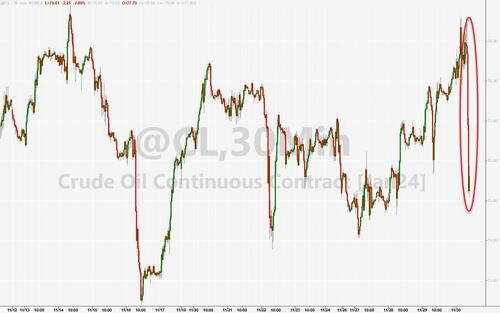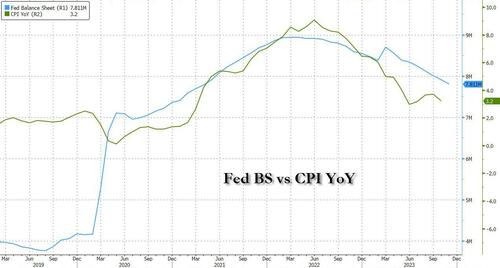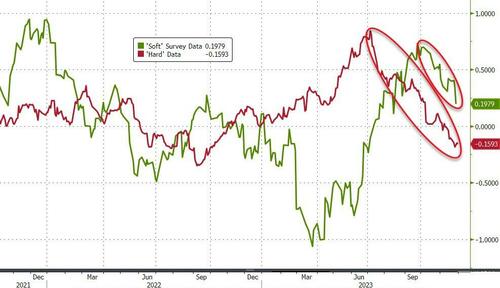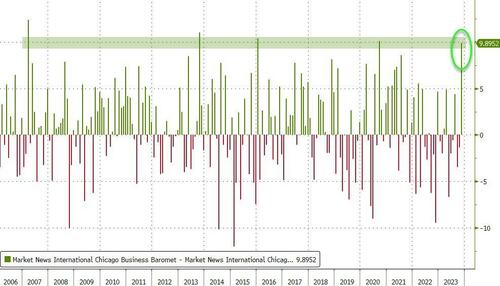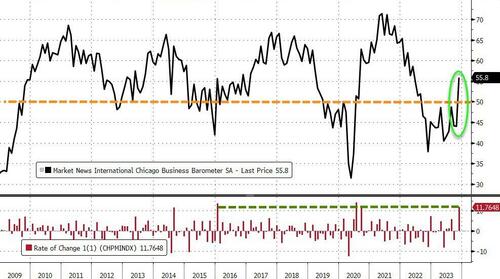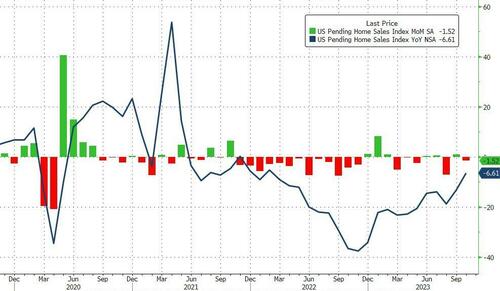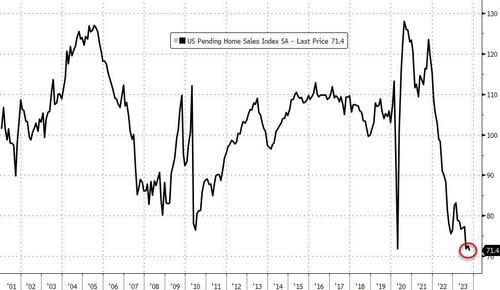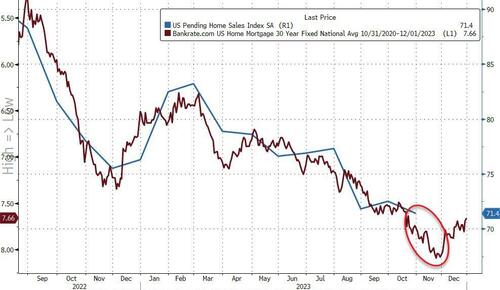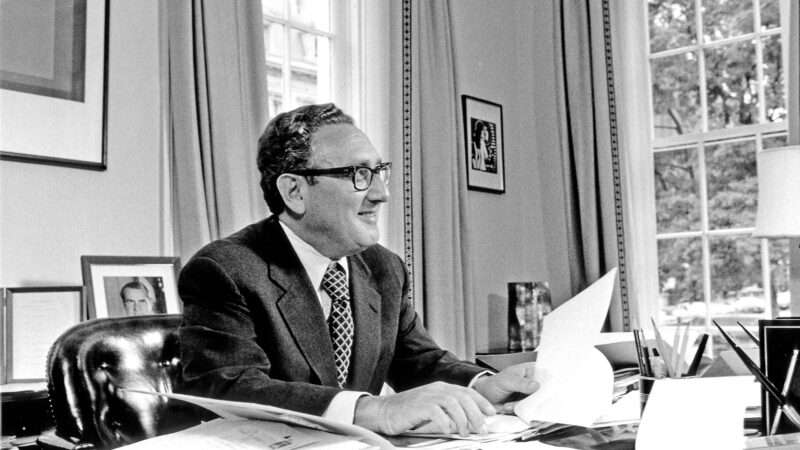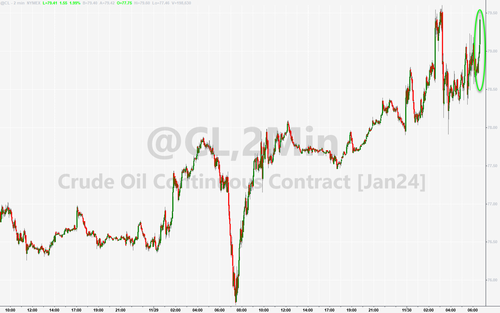Why Oil Is Tumbling Despite Another OPEC+ Production Cut: Wall Street Reacts
Initial leaks from the OPEC+ meeting suggested that the voluntary nature of additional output cuts is likely contributing to the negative market sentiment.
The producers are going to have to come up with some hard numbers to convince the market that the cuts are real, but as the communique below shows, there appears to be none.
The full OPEC+ communique has just been released:
The 36th OPEC and non-OPEC Ministerial Meeting (ONOMM), was held via videoconference, on Thursday November 30, 2023.
The Meeting welcomed HE Alexandre Silveira de Oliveira, Minister of Mines and Energy of the Federative Republic of Brazil, which will join the OPEC+ Charter of Cooperation starting January 2024.
The meeting reaffirmed the continued commitment of the Participating Countries in the Declaration of Cooperation (DoC) to ensure a stable and balanced oil market.
In view of current oil market fundamentals, the Meeting:
Reaffirmed the Framework of the Declaration of Cooperation, signed on 10 December 2016 and further endorsed in subsequent meetings including the 35th OPEC and Non-OPEC Ministerial Meeting on 4 June 2023; as well as the Charter of Cooperation, signed on 2 July 2019.
Noted that, in accordance with the decision of the 35th OPEC and non-OPEC Ministerial Meeting, the completion of the assessment by the three independent sources (IHS, Wood Mackenzie and Rystad Energy) for production level that can be achieved in 2024 by Angola, Congo and Nigeria as follows: Angola at 1,110 t/bd, Congo at 277 t/bd and Nigeria at 1,500 t/bd.
The 37th OPEC and non-OPEC Ministerial Meeting will be held on 1 June 2024 in Vienna.
The reaction is clear – oil prices are falling rapidly as the market had been led to expect 1 million barrels a day of extra cuts, but there’s no mention of them at all in the communique…
Here’s what Wall Street thinks about OPEC+’s actions (or lack of them)…
Alex Longley, Bloomberg
So why are we lower? Drowning in detail is how one trader put it to me. The additional cuts will be announced by OPEC+ members themselves. Others argue this is a repackaging of previously agreed measures, with some uncertain extras. Throw in a decent rally over the last few days (and not to mention month end and expiry day for Brent contracts!), and that’s why we are where we are. Our latest oil futures take is here:
Julian Lee, Bloomberg:
What appears to be the voluntary nature of additional output cuts is likely contributing to the negative market sentiment. There’s a real worry that this might be little more than the repackaging of cuts that were already extended to the end of 2024 back in June. The producers are going to have to come up with some hard numbers to convince the market that the cuts are real. I agree with Arne Lohmann, the communication has been poor. Perhaps that’s a reflection of the difficulty of getting everyone to agree, but that in itself raises concerns about how much of any extra cut will be real.
It’s looking increasingly like the additional 1 million barrels a day of cuts won’t be formalized in new official output targets. Instead members will individually announce their contributions, just as they did in April for the voluntary reductions that came into effect in May. Those also amounted to a shade over 1 million barrels a day.
Giovanni Staunovo, UBS
“It seems the OPEC+ production cuts are “voluntary” cuts, not part of an OPEC+ agreement. Hence the concern is that a large fraction of it could be a pledge on paper and effectively less barrels being removed from the market.”
Arne Lohmann Rasmussen, A/S Global Risk Management
“They did the right thing and reacted to the looming 2024 surplus. But the performance/execution has been really poor. Quotas being announced individually was not good communication. However, the risk probability of oil going significantly lower should now be small.”
Dominic Ellis, UBS
Potential Reasons Why Oil Is Fading Post Announcement Of OPEC+ Cut. Trying to understand the fade in oil since the news earlier of the ~2mb/d OPEC+ cut for Q1. Potential causes for concern: 1.3mb/d of the total is an extension of the existing Saudi and Russian cuts which, are either already in most assumptions for 1Q24 (in the case of the Saudi 1mb/d) or can’t fully be trusted (in the case of the Russian 300kb/d). Then there’s the incremental 200kb/d cut from Russia, which would be new versus current expectations, but is probably heavily discounted by markets given historic weak Russian compliance. Finally, on the remaining 500kb/d, it isn’t clear how much of this will actually result in barrels coming out of the market, rather than “paper” cuts against higher quotas, or cuts versus quotas that are already not being hit. I still find the drop in oil puzzling, particularly given news that Brazil will be joining the OPEC+ group from January 2024, but this is a good example of OPEC’s opacity being counterproductive.
There will be no press conference after today’s virtual meeting.
Tyler Durden
Thu, 11/30/2023 – 11:50
via ZeroHedge News https://ift.tt/ltFXHZ8 Tyler Durden
